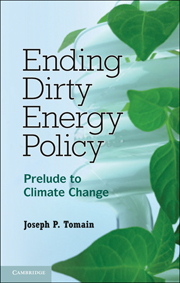‘Tomain’s is that rare monograph on a subject as complex and even arcane as energy regulation, which is at once lucid, informative, and compelling in its explication and argument. The book reveals and integrates the wide range of technical, policy, and political issues that together make up the US approach to energy.’
John S. Applegate - Indiana University
‘Written by one of the nation's foremost authorities on energy regulation, Dirty Energy Policy takes a clear-eyed look at the history of how law and policy have led to the dominance of fossil fuels, and it lays out a path - admittedly mountainous and bumpy - to a transition to more (though certainly not total) reliance on efficiency and renewables. Many readers will agree; all will be provoked.’
Michael Gerrard - Columbia Law School
‘Dirty Energy Policy is a cogent, careful, and - perhaps best of all - hopeful argument in favor of transforming our energy policy from dirty to clean.’
Lisa Heinzerling - Georgetown Law School
‘One of the pre-eminent experts in US energy law, Professor Tomain has written a powerful critique of antiquated ‘hard path’ approaches to energy regulation and offered an accessible introduction to the ‘soft path’ approaches that [the US] will have to adopt to ensure an economically and environmentally sustainable future.’
Thomas O. McGarity - University of Texas, Austin
‘Energy policy is the largest failure in US history and the make or break issue for our future. Joseph Tomain offers a remarkably clear, cogent, and insightful assessment of our options and a plausible path forward.’
David W. Orr - Oberlin College
‘Joseph Tomain presents a carefully researched, clearly written, and persuasive account of how the United States can reform energy policy. While the challenge is daunting, Tomain points the way forward by revealing how law, policy, and politics contributed to the creation of our carbon-based economy, and how these forces can be mobilized to achieve a new energy future.’
Sidney Shapiro - Wake Forrest University





